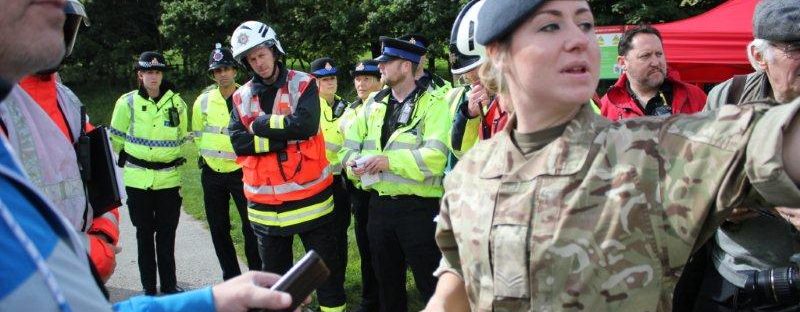MMU journalism students’ exclusive role in Exercise Triton
'10 dead and 30 casualties' in major disaster exercise involving more than 30 organisationas
Students grill authorities at press conference
Journalism students from MMU took part in one of the biggest live exercises in the country – designed to test the capability of the emergency services in a disaster scenario.
More than 30 organisations across the region and nationally took part in Exercise Triton which saw dozens of emergency vehicles at sites across Greater Manchester and Chinook helicopters flying across the skies.
The complex scenario used was designed to test how local authorities, emergency services and other partners are equipped to tackle a major emergency working together.

‘Players’ also included the military, government, health and utility companies, as well as voluntary agencies.
The exercise started last Monday and student journalists from MMU were invited to GMP’s headquarters to grill the authorities a mock press conference. Representatives rom the police, United Utilities and the Environment Agency also fielded questions from the trainee journalists.
The disaster scenario involved the bursting of a dam at Dove Stone reservoir following heavy rainfall.

Police reported 10 people dead and 30 casualties when their coach went into the River Tame, and three students and a teacher 'lost in the water' after a canoeing trip.
The village of Mossley was under water with residents being evacuated and substations knocked out, with 200,000 homes without basic amenities and 9,000 residents with no prospect of returning to their homes.
Paul Argyle, Chair of Greater Manchester Resilience Forum, said: “Exercise Triton II was a hugely complex emergency planning exercise and I would like to thank all of the agencies that have taken part this week.
"This was a very detailed scenario which had impacts across every part of the region and necessitated a full range of partners taking part.
"The scale of the destruction and chaos in this the exercise was deliberately designed to test the region at full stretch.

"We have to do this to ensure we are well prepared to deal with any future real-life event or disaster that might occur – and it is also invaluable that those taking part got the chance to practise essential response skills that are would be used during a major incident like this.
"I would particularly like to thank all the volunteers who took part in this exercise. The patience and understanding of local residents and communities on Thursday – as response plans went into effect at 'live' sites on Thursday – was also greatly appreciated."


